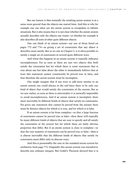But one feature is that normally the resulting axiom system is in a sense more general than the objects one started from. And this is why for example one can often use the axiom system to extrapolate to infinite situations. But it also means that it is not clear whether the axiom system actually describes only the objects one wants—or whether for example it also describes all sorts of other quite different objects.
One can think of an axiom system—say one of those listed on pages 773 and 774—as giving a set of constraints that any object it describes must satisfy. But as we saw in Chapter 5, it is often possible to satisfy a single set of constraints in several quite different ways.
And when this happens in an axiom system it typically indicates incompleteness. For as soon as there are just two objects that both satisfy the constraints but for which there is some statement that is true about one but false about the other it immediately follows that at least this statement cannot consistently be proved true or false, and that therefore the axiom system must be incomplete.
One might imagine that if one were to add more axioms to an axiom system one could always in the end force there to be only one kind of object that would satisfy the constraints of the system. But as we saw earlier, as soon as there is universality it is normally impossible to avoid incompleteness. And if an axiom system is incomplete there must inevitably be different kinds of objects that satisfy its constraints. For given any statement that cannot be proved from the axioms there must be distinct objects for which it is true, and for which it is false.
If an axiom system is far from complete—so that a large fraction of statements cannot be proved true or false—then there will typically be many different kinds of objects that are easy to specify and all satisfy the constraints of the system but for which there are fairly obvious properties that differ. But if an axiom system is close to complete—so that the vast majority of statements can be proved true or false—then it is almost inevitable that the different kinds of objects that satisfy its constraints must differ only in obscure ways.
And this is presumably the case in the standard axiom system for arithmetic from page 773. Originally this axiom system was intended to describe just ordinary integers. But Gödel's Theorem showed that it is




